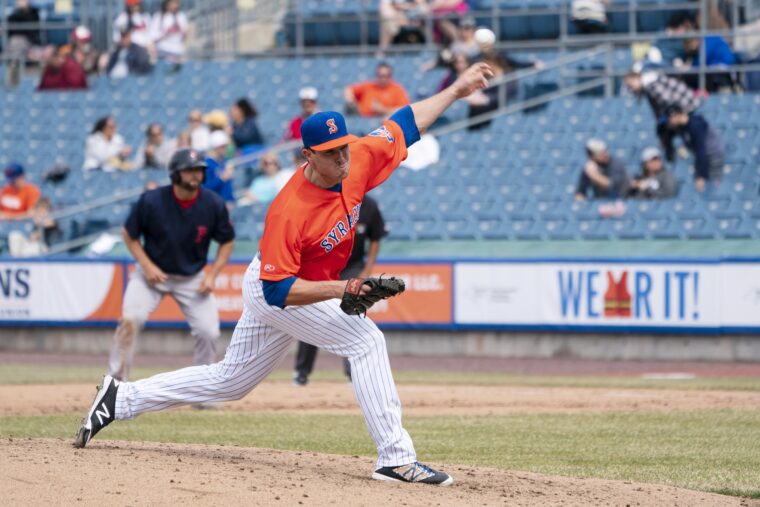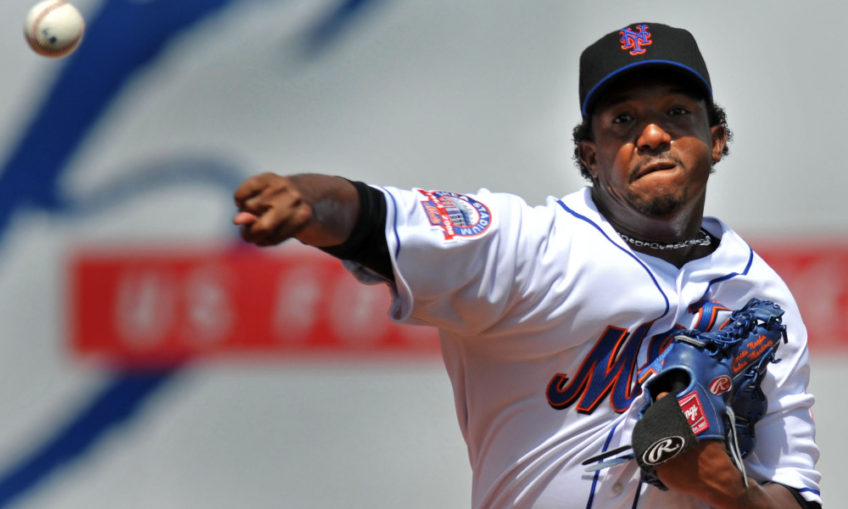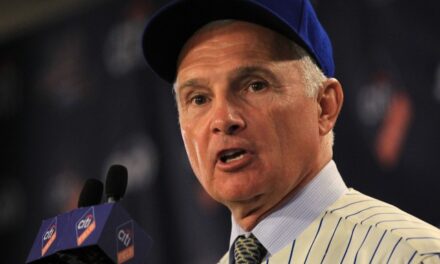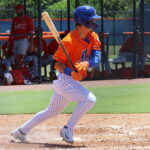
In mid-November, just a few weeks after the New York Mets officially announced Brodie Van Wagenen as the 13th general manager in team history, the club made its first official signing under the Van Wagenen era: left-handed reliever, Ryan O’Rourke.
O’Rourke, 30, was signed to a minor-league deal with an invite to big league spring training. With the Mets only carrying one lefty reliever on their 40-man roster at the time, the signing made sense for both team and player, as O’Rourke was itching to get back on the mound after last appearing in a major league game in 2016, after undergoing Tommy John surgery in early ’17.
The Massachusetts-native was selected by the Minnesota Twins in the 13th round of the 2010 MLB Draft out of Merrimack College. He made his major league debut in 2015 for the Twins, appearing in 28 games from early July to the end of the season.
While his overall numbers weren’t spectacular (4.77 FIP, 1.409 WHIP), O’Rourke posted strong splits against lefty batters, holding them to a .171/.292/.268 slash.
In the following season, O’Rourke made positive strides, increasing his groundball rate by nearly five percent (40.4 to 45.3), decreasing his walk rate by over five percent (15.5 to 9.9), and lowering his ERA by more than two runs (6.14 to 3.96).
He continued to baffle left-handed hitters at the plate, holding them to a slash of .077/.167/.192 with a 35.5 strikeout rate in ’16.
Appearing to be a viable weapon against left-handed hitters out of the pen, O’Rourke was dealt a tough blow at the end of April in 2017. Initially shut down and placed on the disabled list due to a strained flexor mass in his elbow late in spring training, O’Rourke received the news that he had a partially torn ulnar collateral ligament, with Tommy John surgery forthcoming.
O’Rourke missed all of the ’17 and most of the 2018 season, save for 14.1 innings pitched between several Baltimore Orioles’ minor league affiliates. Looking for the best opportunity to get back to the majors, O’Rourke and his agent kept the Mets penciled as a team that could be a match. The lack of lefty relievers on the Mets active roster in the offseason, coupled with his appreciation of the club’s honesty and positive talks during negotiations, made the signing a good fit for the southpaw.
Looking to prove that he could get major league hitters out, O’Rourke headed to camp with specific goals and expectations for himself and pitched well in relief for the Mets.
O’Rourke posted a 1.74 ERA over 10.1 innings in spring, the lowest mark among Mets pitchers with at least ten innings pitched. He was a candidate for the last spot in the Mets’ pen up until just a few days before the start of the regular season before the team notified him that he wouldn’t be making the club.
For now, O’Rourke is pitching in relief for the Mets Triple-A affiliate in Syracuse, hoping for the chance to once again be on a major league mound to neutralize lefty hitters.
I had the privilege of speaking with O’Rourke near the end of spring training, where we discussed his early years in the game, coming back from Tommy John surgery, and signing with the Mets this offseason.

MMO: Who were some of your favorite players growing up?
O’Rourke: Being from the Boston area, Pedro [Martinez] and Nomar [Garciaparra] were two guys that I definitely grew up watching and tried to emulate in the backyard.
[Ken] Griffey Jr. and Randy Johnson were on Seattle at the time, but they were also exciting and were two of the greats in the game as well when I was a kid.
MMO: At what age did you start primarily pitching?
O’Rourke: I wouldn’t say there was a point; I didn’t really focus on baseball at all. The summer you played baseball, the fall football, and the winter and spring was hockey.
It was never a real focus on pitching itself. If the coach wanted me to pitch, I pitched.
MMO: I read that when you attended St. John’s High School in Shrewsbury, Massachusetts, Ron Darling’s dad was a coach of yours? Is that true?
O’Rourke: Yeah, yeah. Ron Darling Sr. was my coach. He was hard on us but he definitely made us better back then. He was the pitching coach.
MMO: Prior to the 2010 Major League Draft, did you have any idea of which teams were interested in you? Had the Minnesota Twins (who selected O’Rourke in the 13th round) been a team on your radar during your tenure at Merrimack College?
O’Rourke: Not really. It’s funny, the scout who drafted me said he was trying to keep it a secret for a while. He was very interested in me, but he didn’t want it to get out and he was actually hoping that I didn’t pitch as well so that people would be kind of turned off by me.
But it actually worked out in my favor and not his, because Bobby Valentine went to a game that I pitched at in college. He just happened to be there because I think his neighbor’s kid was on the other team. By luck, he happened to be there and I pitched that game and I think I had thrown in either the first or second inning. Bobby walked over to the pro scouts and said, “Boy, this is what they look like right here.”
The scout was pissed because now he’s got a major league manager saying this kid’s good. [Laughs.]
MMO: July 7, 2015: your major league debut. What memories do you have from that day against the Baltimore Orioles?
O’Rourke: That’s just a whirlwind of a day, a day that will stand out. I didn’t sleep the night before. My roommates were setting their alarms and they were pumped for me. I just got there and saw some of the guys I had met in spring training, and I was kind of hoping I’d be thrust in that first game. And it happened to work out that way.
I remember one of the vets told me to remember to bend my knees when I’m running [out]. When you’re running out there for the first time, things get a little shaky there.
MMO: You underwent Tommy John surgery in May 2017. At what point during spring did you start feeling pain in your UCL? How was the rehab process for you?
O’Rourke: It wasn’t really any pain before that, I would just take the ball and go pitch every day. You’re never going to pitch at 100 percent, so it just happened one day. I threw a pitch, felt something, and I actually tried to keep pitching for another three or four more days but that’s kind of when it all really went downhill. Those three or four more games it was definitely very painful at that point.
MMO: In 2018, you appeared in a combined 14.1 innings for several of the Orioles’ minor league affiliates. Were there setbacks in your rehab that limited you to so few innings?
O’Rourke: I wouldn’t say setbacks, but there was definitely a point where you expected to be back as soon as you can and then I just needed to realize that twelve months wasn’t realistic at that point in time.
My rehab turned into a little bit longer, but to have some healthy innings was all that mattered to me at the end of the day for last year.
MMO: I’ve read that before almost every major league appearance you’ve made, you threw up beforehand. Is that true?
O’Rourke: Yeah, even in the minors and college, too. It’s just one of those things that happen I guess. One of the guys was asking me about that today. He said he read that online and was asking why it was. I told him, ‘I don’t’ know. I don’t know if it’s nerves or anxiety or just being that amped up.’
I think my body is so accustomed to it now that if it doesn’t happen, my internal clock is like, all right, we’ve got to throw up now. It’s just a part of me and I’m not that embarrassed about it.

MMO: You definitely shouldn’t be. I can’t imagine what the feelings are like when you’re preparing to head into a major league game where tens of thousands of screaming fans are hanging on your every pitch!
Was there a time you can remember when this all started?
O’Rourke: When I was first starting, maybe my first full-season is when it was kind of a more frequent thing. And then from there on out it’s taken spells of a couple of times, maybe a month. Once I got to the major leagues is when [it became more frequent].
Not that other leagues don’t matter in terms of high school or college and everything else, but the lights are a little brighter up there. So maybe that helped the frequency of it.
MMO: I heard you on the Pitch by Pitch podcast talk about a former coach who told you to pick something to stare at the park when you’re going through a rough stretch to essentially reset. I’ve spoken with Bob Tewksbury, the former starting pitcher who worked with the Red Sox, Giants, and now Cubs as their mental skills coach, who speaks highly of visualization.
Can you talk about what that visual is for you and how you utilize it to settle your nerves?
O’Rourke: It really resonated with me. I think there’s a big emphasis now on visualization and positive visualization and how a positive mindset will help bring positive results. I do agree with that and, obviously, there’s going to be a few outliers with every statement. I think for me, I use the visualization as much as a relief.
As a pitcher, you can’t always keep everything internal, whether it be your anger or your focus; you have to focus on so many other parts of the game.
I think whenever I look up at the pole or whatever spot I pick out it’s like, all right, I’m releasing everything, and bang, I’m right back in the game or into what I need to worry about.
It’s like my reset button. That’s what I keep it as. People might think it’s a little quirky but I just stare at something. It’s something I’ve worked on and is a part of me.
MMO: The very first signing of the Mets’ Brodie Van Wagenen-era was agreeing to a minor league deal with you this offseason. Can you talk a bit about the process of signing with the Mets, and what made them so appealing for you?
O’Rourke: This was my second go-around in free agency and I think I was a little bit more seasoned. My agent’s been great; he’s been through a bunch of them. We knew there were certain teams we had circled who had their lack of lefties, whether it be on the 40-man or the minor leagues. The Mets were one of them. At that point in time, they had one lefty on their 40-man, and they were definitely a team we looked at for free agency to open up.
Later we got a call from the Mets, and it was kind of a match made in heaven. It was really good and the talks were positive the whole time. Basically, everything they said to me has been true for the most part.
You look for honesty with a team. Once you sign that paper, you’re kind of their property. But they’ve been great to me so far and they gave me a chance in spring training to come in and compete. I think I did that. I think I exceeded their expectations maybe a little bit, but that was my goal. I think I put myself in a position for a spot in the future when there is a need up there.
MMO: You had a terrific spring and the results were certainly there for you. Was there anything, in particular, you were looking to work on this spring? Or was it mostly about proving you were healthy?
O’Rourke: There were hurdles that I set out for myself, I’d say more internally. I just need to get people out again. Last year, I was healthy. This year, for the winter, I kept proving that I was healthy, so that was good for me personally. It was after that I was like, I need to get major league hitters out again.
It’s tough in spring training with all the substitutions and you’re facing guys who are younger and prospects. They’re not seasoned veterans yet. So, when I was able to get a few innings against some of the names that the average fan would recognize, it was good to see how my stuff still plays up there.

MMO: I read that this past offseason you worked for a software company in Boston called Datadog. Can you talk a bit about your work there?
O’Rourke: They were great! I know this game is going to end for me at some point in time, hopefully it’s in 12-13 years, but it could be sooner than that. Who knows?
I have a degree in finance and I’m trying to put my best foot forward to keep using that and keep my brain and skills fresh. They put me into their skills and development team and I worked with the enterprise side. My manager was Bianca, her and Cam – my manager and director – they couldn’t have been better with me, treating me like the intern. [Laughs.] And that’s what I wanted, I wanted them to push me and hold me to a quota. I had to go in there a provide additional results, and I really did learn a lot. I can’t thank them enough for giving me that opportunity.
MMO: As a reliever, I’m curious what your thoughts are on the three-batter minimum rule that’s going to be implemented starting next year?
O’Rourke: I don’t like rules that change the game very drastically. I’m sure at the time when they lowered the mound, because Bob Gibson was too good, I’m sure he wasn’t too happy with the rule. There are going to be people who are probably against this. I say the majority will be because it takes away from the authenticity of the game, which is something that I respect and I wouldn’t want to change too much.
On the flip side, I do understand the timing of it. You have a starter go out and he lets up two hits and then you go to a lefty and then a righty and then lefty. That’s a long inning for three consecutive outs. That’s probably taking twenty minutes on its own just to get three outs when it could’ve been a lot shorter. I do understand both sides of the argument.
For me, I don’t see myself as a lefty-lefty guy, so it’s not going to bother me. My year in ’16, when I had a good year, it was throwing multiple innings and getting a couple of guys and going back out the next inning. I want to work myself into a solid 7th-8th inning role guy.
MMO: There are certainly valid concerns on both sides of the argument. I do think you might see more intentional walks if a pitcher doesn’t have it that night.
O’Rourke: Intentional walks you’re going to see and fake injuries. I hope the MLB realizes that. There’s going to be guys that say, oh, my elbow hurts, and then pull them from the game. Then two days later they’re back in there. And there’s no way to prove he wasn’t hurt.
I know it’s in effect for next year, so obviously, things can change. There’s going to be a tipping point with the timing of these games. I don’t know if this is the way to do it.
MMO: Do guys in the clubhouse often talk about the various rule changes?
O’Rourke: Oh yeah. When we have our Players Association meetings, the whole discussion for the next couple of days is based probably on stuff like that. Also, the rules in the Atlantic League, we talk about that too. These things are going to affect a lot of guys’ livelihoods, so it’s something that they’re very passionate about and something they definitely care about.
MMO: Thanks very much for your time today, Ryan. Best of luck this season.
O’Rourke: I appreciate it, man. Thanks.
Follow O’Rourke on Twitter, @RyanO_Rourke















